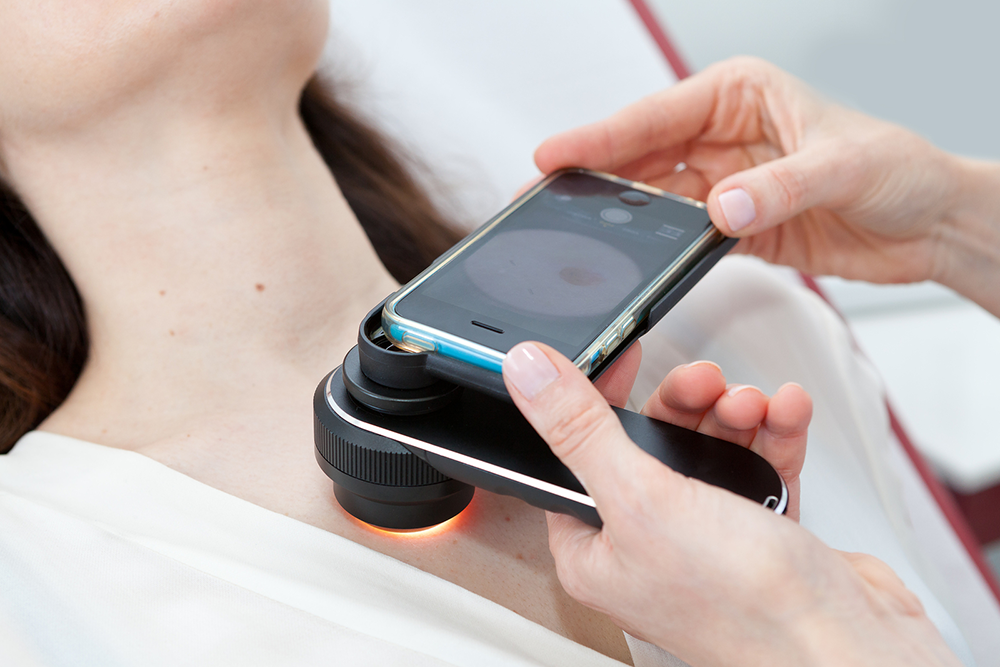“All of us are at risk for skin cancer,” says Baylor Scott & White Specialty Clinic – Marble Falls Dermatologist Brian Ransdell, M.D. According to the Skin Cancer Foundation, “One in five Americans will develop some form of skin cancer during their lifetime. More cases of skin cancer are diagnosed annually than the combined totals from breast, prostate, lung and colon cancers.”
What Is Skin Cancer?
There are three types of skin cancer: basal cell carcinoma, squamous cell carcinoma, and melanoma.
Basal cell carcinoma (BCC) is the most common skin cancer. It is rarely fatal, but can be disfiguring is left untreated. BCC often looks like open sores, red patches, pink growths, shiny bumps, or scars. Squamous cell carcinoma is the second most common form of skin cancer. It is rarely fatal, but can be disfiguring. SCCs often look like scaly red patches, open sores, elevated growths with a central depression, or warts, They may crust or bleed. Although only about 1-2 percent of basal and squamous cell carcinoma patients will have a fatal outcome, these cancers should not be taken lightly. About 90 percent of these cancers are due to excessive sun exposure. The face and hands are the most exposed to the sun. These cancers can be very disfiguring if left untreated. Both skin cancers commonly have a precancerous skin lesion called Actinic Keratoses. These areas usually present with scaly, crusty growths, lesions, caused by damage from the sun’s ultraviolet (UV) rays.
Melanoma is the most deadly form of skin cancer. Melanoma is one of only three cancers with an increasing mortality rate for men, along with liver cancer and esophageal cancer. Melanoma is more deadly because of the risk for metastatic disease. Melanomas resemble moles. The majority of melanomas are black or brown, but they can also be skin-colored, pink, red, purple, blue or white. Sun exposure, especially sunburns, are the greatest risk factor in developing melanoma.
Why You Need a Skin Cancer Screening—Who’s At Risk?
Dr. Ransdell said skin cancers can affect anyone, but those with increased risk include:
• Caucasians
• Men over 50-years-old
• Exposure to ultraviolet light, from the sun and indoor tanning devices
• Fair skin types: Those with red or blonde hair and blue or green eyes
• Greater than 50 moles
• A blood relative who has had melanoma
• A previous diagnosis of either melanoma or non-melanoma skin cancer
• History of other previous cancers, such as breast or thyroid cancer
Even if you do not have these risk factors of skin cancer, it is important to get a skin cancer screening. It will make you more aware of moles or spots to keep an eye.
What Can I Expect at a Skin Cancer Screening?
A skin cancer screening is a full body examination with a dermatologist
“Patients should come in prepared to discuss any concerning or changing lesions that they have noticed,” said Dr. Ransdell.
Because skin cancers can occur anywhere on the external parts of the body, your doctor will do a full exam within your comfort level. They will examine moles, freckles or bumps. Depending on what they find, they may recommend removing lesions to avoid the risk of skin cancer developing.
“1 in 5 Americans will develop some form of skin cancer during their lifetime” – Dr. Brian Ransdell, Baylor Scott & White Specialty Clinic – Marble Falls Dermatologist
Avoiding Skin Cancer
• To help avoid the risk of skin cancer, the American Academy of Dermatology also recommends that everyone:
• Seek shade when appropriate, remembering that the sun’s rays are strongest between 10 a.m. and 2 p.m.
• Wear protective clothing, such as shirts, pants, hat and sunglasses.
• Generously apply a broad-spectrum, water-resistant SPF 30+ sunscreen thirty minutes before sun exposure and reapply at least every two hours during sun exposure.
• Use extra caution near water, snow and sand because they reflect the damaging rays of the sun-apply sun screen more frequently.
• Avoid tanning beds
Brian Ransdell, M.D. is a board-certified Dermatologist at the Baylor Scott & White Specialty Clinic – Marble Falls. If you have any concerning skin lesions, please call 830-201-7100.







Recent Comments